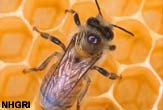Why Bees Eat Their Kin

Bees can be ruthless relatives. Bumblebee queens eat their offspring's eggs, and honeybee workers make meals of their siblings' eggs.
But this ritual, gruesome by human standards, makes a bee family more productive.
Although worker bees are usually unable to mate, as females they can lay unfertilized eggs that emerge as males, if given the chance. The same applies to wasps and ants. But many don't survive.
- Imaginary Friends and Enemies All Good, Scientists Say
- New Insight into How Blood Clots
- Champagne Bubble Mystery Solved
- How Bees See
- Why Bees Fly With Landing Gear Down
- Bees Can Predict Temperature in Flowers
- A Clean Bee of Health
In all of these cannibalistic acts, each eater's goal is to reduce the number of its genetic competitors.
"The queen eats the workers' eggs because she is more related to her own offspring," said entomologist Tom Wenseleers of the Catholic University of Leuven, Belgium. "In the honeybee, the workers eat other workers' eggs because they are collectively more related to the queen's offspring."
Workers are prone to eating their siblings' eggs—an act scientists call "policing"—when their mother queen mates with multiple males. In these species, including the honeybee, most workers are half-sisters, and more related to their brothers (sons of the queen) than nephews (sons of other workers).
Half-sisters show no mercy, devouring their nephews.
Get the world’s most fascinating discoveries delivered straight to your inbox.
In species with promiscuous queens, workers' sons are reared 100 times less than species with a single father, according to a new survey of more than 100 species of ants, bees and wasps conducted by Wenseleers and Francis Ratnieks at the University of Sheffield in the United Kingdom. The findings were published in the November issue of the journal The American Naturalist.
Both types of egg-eating support William Hamilton's 1964 relatedness theory: Closely related animals cooperate, while more distant relatives behave nastily toward one other.
"Close relatives are genetically more valuable, as they carry many copies of one's own genes," Wenseleers told LiveScience.
- Top 10 Deadliest Animals
- Mating Game: The Really Wild Kingdom
- Cannibalism Rife in Mormon Cricket Swarms
- Neanderthals Were Cannibals, Study Confirms
- Top 10 Animal Senses Humans Don't Have
- All About Bugs


